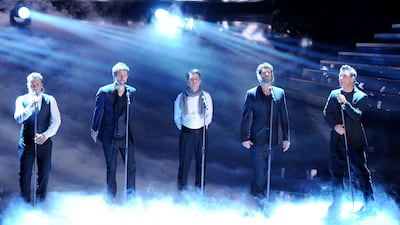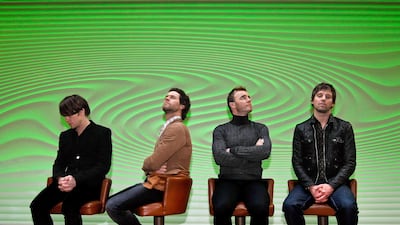Take That turn 30 on Monday. On July 12, 1991, the five-piece band released their debut single Do What You Like to a rather muted reception.
While not the welcome they hoped for, the group steadily honed their craft and a couple of years later found their winning blend of exuberant pop and emotive balladry.
A lot of that quality was inspired by a combination of talent and internal rivalry, particularly between chief songwriter Gary Barlow and former member-turned solo star Robbie Williams.
Speaking to The National in 2014, Barlow said the competitive atmosphere between the two was real. “There is a lot of rivalry between me and Rob. It always has been and it would even go to what shoes we were wearing. It is a fun rivalry,” he said.
“When I play Rob my new single, I know he would say ‘that’s great and wow, I wish I wrote that'.
“And it’s the same when he releases a song. I listen to it very closely and it makes me go back to the studio and get better. That’s what it is all about, to look at your peers and say: ‘Right, I need to get better.’"
It is a similar sentiment Take That’s success inspired among peers and a future generation of boy bands such as Boyzone and Westlife.
While the band are yet to call it a day, Take That have already built a legacy of success by selling nearly 15 million albums and producing a string of era-defying pop hits.
Here are 10 songs showcasing the best of Take That.
1. 'Do What You Like' (1991)
Take That's debut single was even too generic for radio with its inane chorus and tin-nish production. What also didn't help is its odd music video, which has the group members smearing jelly all over themselves.
Judging by this inauspicious start, you would be hard-pressed to believe Take That would be capable of the sublime pop music released years from now.
2. 'Why Can't I Wake Up with You' (1992)
By this stage, Barlow was finding his feet as a songwriter and Take That was making waves with songs It Only Takes a Minute, A Million Love Songs and Could It Be Magic all landing in the UK top 10.
That potential neared its peak with Why Can't I Wake Up With You reaching No 2, then the group's highest chart position.
A breezy mid-tempo number full of plaintive vocals, Take That were inching closer to finding their hit-making formula.
3. 'Pray' (1993)
When it rains it pours. Pray began a killer three-year chart run during which all but one of the proceeding eight singles reaching the top of the UK charts. It was the period when Take That truly came into its own.
A lot of that is down to Barlow finding his voice as songwriter. His love for blue-eyed soul and gospel music shines in Pray, a track displaying the unabashed earnestness the group would go on to perfect.
4. 'Babe' (1993)
Babe was a risky move that ultimately paid off. After carefully expanding their fan base over the course of 10 singles, Take That ditched the ebullient melodies in this brooding ballad about salvaging a broken bond.
This was also the first time Mark Owen took lead vocals. While his range is more limited than Barlow's, it has a welcome vulnerability the group would use frequently throughout the years.
5. 'Back For Good' (1995)
Take That found pop-perfection and a global fan base with this triumphant ballad, written by Barlow and ruminating on life, love and second chances.
The appeal here lies in how organic it all sounds with the song's infectious arrangements built on a piano. That earthy quality allowed the group to transcend its youthful fan base and capture a more mature crowd.
Unfortunately, just as they were reaching their creative zenith, internal tensions within Take That spilled out into the open.
Williams’s fractious relationship with Barlow pushed the former to leave and launch a successful solo career. After completing a European tour as a quartet, Take That parted ways in 1996, only to return a decade later.
6. 'Patience' (2006)
Perhaps learning from the muted reception to their debut song, Do What You Like, Take That returned with one of pop music’s greatest comeback singles. Patience is a stunning folk ballad whose power lies in its soul-bearing lyrics.
The vocal performance, soulful and resigned, compliment the lyrics powerful mediation on age: “My heart is numb, has no feeling / So while I'm healing / Just try and have a little patience".
Not only did its chart-topping position allow Take That to pick up where they left off, Patience also cemented Barlow as one of the premiere songwriters of his generation.
7. 'Shine' (2007)
A powerful song that proved that Patience was no fluke. Shine is a moving account of former member Williams's battle with depression.
In an olive branch extended to a former childhood friend, Barlow sings: "You're such a big star to me / you're everything I wanna be / But you're stuck in a hole and I want you to get out."
Williams eventually reciprocated the gesture and performed the song with Barlow in a 2010 radio performance for the BBC.
8. 'The Flood' (2010)
With their friendship restored, Williams returned to Take That to record their sixth album Progress.
As the lead single, The Flood is an anthemic synth-pop number about finding strength in resilience. That message takes on extra resonance in light of Williams's publicised struggles.
9. 'These Days' (2014)
With the group now reduced to a trio after the departure of Williams and Jason Orange, Take That showed they were still in business with These Days.
The lead single of the seventh album III boasts light-hearted sounds harkening back to the group's early days.
Indeed, the song's opening lyrics drives that nostalgic vibes home: "Take me back, to where it all began”
10 ‘Higher Than Higher’ (2015)
The last exceptional Take That single, Higher than Higher is a pristine and meticulously produced track featuring everything from strident marching band beats, acoustic guitars and synths.
While it could have all sounded messy, that welcome lightness is provided by Barlow's breezy vocals about the search for peace through contentment.
While Take That haven't really bothered the charts since Higher than Higher, their place in UK pop music history is still well and truly assured.







